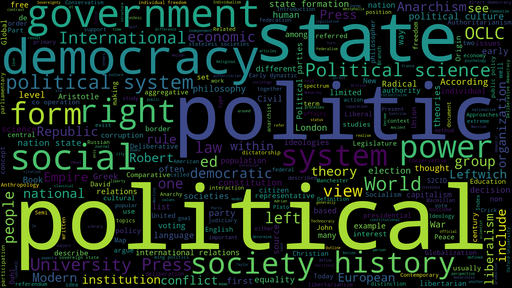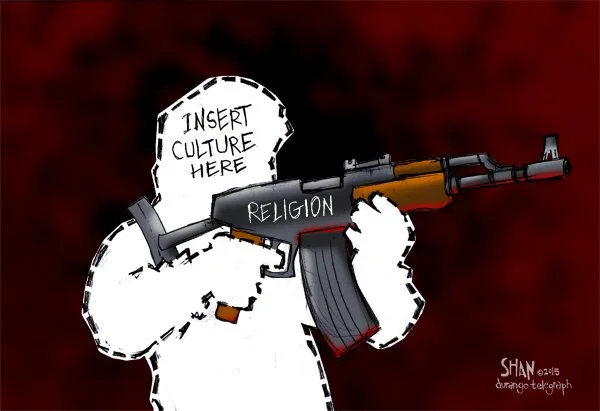Religion Remixed
Trip-Wired Topics
Photo by Ruth Caron on Unsplash
Recently many of my readers survived American Thanksgiving. I say “survived,” because unresolved interpersonal dynamics mixed with trip-wired topics can ignite the happiest family feast into a destructive verbal explosion. You can be thankful if you found your Thanksgiving together a time of giving thanks.
It’s a truism in North America that polite conversations should avoid three controversial topics: politics, religion, and money. Some people replace “money” with “sex.” But everyone retains “politics” and “religion” on the list of forbidden topics. Yet I’d guess that few family gatherings last week actually steered clear of them. And when table talk devolved into tear-laden fight fests, disagreements about religion and politics were in the mix.
Why are civil conversations about politics and religion so hard? Among many reasons, one is what my post “True Religion?” calls the “politicization of religion.” Religion is not the only social domain that people politicize. It also happens in education and schooling and in the arts and literature, not to mention civil society as a whole when culture wars break out like those described in my book Art in Public (2011). Still, the politicization of religion is markedly fraught for family gatherings, and it’s especially damaging to the “precious mess” we call democracy. To see why, we need to reflect on how politics and religion interconnect, a vast and convoluted topic. I’ll try to be clear and concise.
Politics
I discuss the nature of politics in my recent books Shattering Silos (pp. 1-19, 87-103, 172-186) and Social Domains of Truth (pp. 205-230, 240-246), and I return to it in my forthcoming Adorno, Heidegger, and the Politics of Truth (pp. 77-99, 120-127). There I say the term politics has three overlapping meanings: (1) collective struggles for liberation (e.g., gender politics); (2) an ongoing push and pull in the public sphere (e.g., radio, television, and new social media) over matters of general concern (e.g., health care and climate change); and (3) activities or events within the state (e.g., federal government) and suprastate organizations (e.g., United Nations).
Image by Madhav-Malhotra-003, CC0, via Wikimedia Commons
These are diverse meanings. Yet all three involve interrelations among power, justice, and freedom. Whether in emancipatory movements, public communication, or the affairs of state, politics is the pursuit of justice and freedom from positions of relative power. Moreover, we can evaluate forms of political engagement in each respect. Do current protestors, pundits, and political parties acquire and exercise power in ways that are both legitimate and appropriate to the ends of justices and freedom? Are they really aiming at and achieving justice? Do their empowered struggles for justice actually free people and other creatures from oppression?
Politics, when pursued properly, employs justifiable power to achieve both justice and freedom. So it’s never simply a raw struggle for power. Political power must be justifiable with respect to the ends of justice and freedom. In a democratic society, we violate fundamental norms when we refuse or fail to justify our exercise of political power.
Unfortunately, that’s become all too common in American politics. And failures to justify power feed directly upon the politicization of religion. By politicization I mean the tendency to turn whatever is offered by a nonpolitical domain (art, education, religion, etc.) into merely a means to acquire or exercise political power. In the domain of religion, this tendency draws heavily on the weaponization of religious beliefs, to the detriment of religious truth. Let me explain.
Religious Discourse
“True Religion?”, my previous post, portrays religion as fundamentally a matter of hopeful trust and worship toward what ultimately sustains us. I also say the truth of such trust and worship needs to be borne out in how religious adherents live. Hence it’s a mistake to reduce religion to our holding certain beliefs.
Nevertheless, adherents do have religious beliefs, and they can state, debate, reject, or revise them. Let’s call the process of stating and justifying such beliefs religious discourse. Although religious discourse is not central to religion—hopeful trust and worship are—it’s an important element, especially for the contributions religious adherents can make in the political domain.
What are these contributions? Let me single out three: inspiration, challenge, and critique. First, because religions provide visions of what I call “interconnected flourishing,” they can inspire political struggles for justice and freedom. The American civil rights movement is a prime example. Second, by entering discussions in the public sphere about health care, the environment, and many other issues, religious adherents can challenge current assumptions about what really matters. And third, as I’ve shown in an essay titled “Religion in Public” (Religion, Truth, and Social Transformation, pp. 237-251), because religious adherents place their ultimate trust elsewhere, they can critique any and every abuse of state power: the antiwar activism of the late Daniel and Philip Berrigan illustrates how. None of these contributions can occur without using religious discourse.
Deliberation and Dogmatism
Yet how we present religious beliefs in public makes a huge difference. It’s one thing to present a religious community’s convictions on, say, the morality of abortion or the ethics of warfare in a way that shows respect, reciprocity, and responsiveness toward those who think and live differently. Such a stance will ask others to consider the validity of your position. It will welcome discussion and debate. And it will invite uncoerced responses, whether acceptance, rejection, or inattention.
It's quite another thing to present your religious community’s position on public issues as the only right way, for which only acceptance is acceptable. That stance shows neither respect nor reciprocity. Rather, it tries to coerce a response, and not just any response: only acceptance will do. Let me label these two stances the deliberative and the dogmatic ways to present religious beliefs in public.
Cartoon by Shan Wells, Shantroywells, CC BY-SA 4.0, via Wikimedia Commons
Because the dogmatic stance does not welcome discussion and debate, it lends itself to the politicization of religious beliefs. Religious dogmatists on public issues readily turn their beliefs into political weapons, both in the public sphere and in electoral politics. Increasingly they try to silence opposing views and to enshrine their own beliefs in law and public policy. Winning political battles becomes more important than a shared search for justice and freedom. That not only damages a political democracy, where public deliberation is essential. It also destroys true religion. Religion should inspire lives of hopeful trust; dogmatism on public issues turns religion into a catalyst for hateful suspicion. This is so for progressives and reactionaries alike.
Bearing Good Fruit
John Dewey, the great American pragmatist, liked to quote a saying the gospels attribute to Jesus: “By their fruits you will know them” (Matthew 7:15-20; see also Luke 6:43-45). As my book Social Domains of Truth shows, I’m not a pragmatist when it comes to knowledge and truth. Yet there’s something crucial at stake here. If religionists do not show respect and reciprocity in the way they address public issues, then that casts doubt on the truth of their religion. For it’s not bearing good fruit in the political domain.
“Religion in Public,” the essay mentioned earlier, claims religious discourse must belong to an authentic way of life. The most important “arguments” for a religion will be to show “in practice that a religious source of ultimate sustenance truly deserves hopeful trust” (Religion, Truth, and Social Transformation, p. 251). That includes the practices of politics. But it excludes the politicization of religious beliefs.




